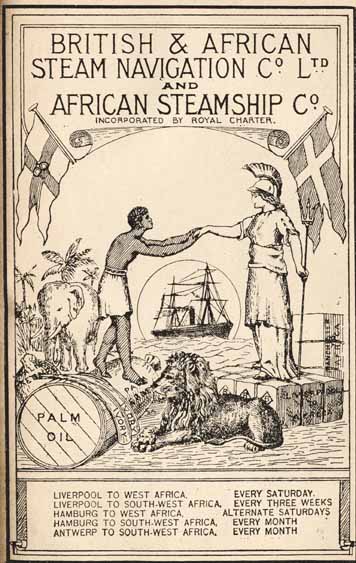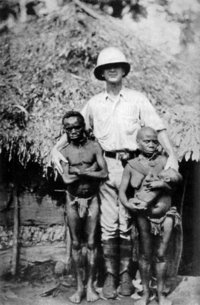
“There were very few people who recognized that Leblanc’s present condition was more the result of unrealized hope than of any thwarted ambition. He had tried in vain to establish some sort of friendly relationship with the Africans, but his knowledge intimidated them and his natural shyness made it difficult for them to approach him. This hostility – or rather, this lack of any response to his efforts – had gradually discouraged him, and his drinking had completed the work. He had become a narrow, bitter person, laughed at by the blacks and mistrusted by the whites” (168).
To me, Leblanc’s character represents the failure of cultural objectivity and appreciation of the “other,” which is one of the main themes that make up the rich tapestry of Sembene’s God’s Bits of Wood. As a young ex-anthropology student, LeBlanc comes to Thies with, perhaps, the naivety of a more liberal ideology of colonialism. What were these “unrealized hopes” that Leblanc is described as having in this excerpt? Perhaps his wish, as the study of anthropology claims to do, was to study the African culture to offer the world an “objective” understanding of its people as a way to bridge the gap between cultures. On paper, this is a very noble idea. One, it seems, that many anthropologists share. But Sembene’s use of Leblanc’s character I think, hints at “the [post colonial] notion of anthropology as somehow complicit in morally unacceptable projects. [There is a consensus that the field of anthropology] grew out of colonialism–perhaps was in league with it–and derived some of its key notions from it, consciously or not…It is often assumed that an example of this exploitative relationship can be seen in the relationship between British anthropologists and colonial forces in Africa, yet this assumption has not been supported by much evidence” (Wikepedia: Anthropology). Not only is Sembene perhaps implying that anthropology is complicit in a colonialist reductive view of another culture, but Leblanc’s character offers a deep insight into the “do-gooder” response of those who are part of the colonial power, who want, but fail, to somehow help fight against it because of their deep indoctrinization of its ideologies.
Sembene says that Leblanc “tried in vain to establish some sort of friendly relationship with the Africans,” but we can read through the lines that Leblanc’s failure was due to something else. We can speculate that it might have been because he brought his own pre-conceived and unconscious colonial ideology into his approach instead of immersing himself in their culture with an openness to see and appreciate who these people really are: their customs, thoughts, beliefs, traditions etc. Whatever Leblanc’s approach was, it clearly inhibited any authentic experience and appreciation of the culture. Sembene gives us an “inside” African perspective; one that looks out onto this kind of colonist (or colonialism) like Leblanc as he tells us why the people were so hesitant to approach him. It wasn’t for any hatred of Leblanc, but because “his knowledge intimidated them and his natural shyness made it difficult for them to approach him.” We can clearly see how actions from different cultures can be misinterpreted as Sembene says, “This hostility – or rather, this lack of any response to his efforts – had gradually discouraged him,” and, as it did with Leblanc, causes a dislike or distrust between people. Through the complexity and skill of the characterization of Leblanc, Sembene offers a rich insight into this subversive dynamic of colonialism.
Although Leblanc seems to be on the side of the strikers and the African people, Sembene portrays Leblanc’s good intentions tied up with too much self-consciousness. All his vain efforts “had gradually discouraged him, and his drinking had completed the work. He had become a narrow, bitter person, laughed at by the blacks and mistrusted by the whites.” As Leblanc fails to realize that the root of his problem is his lack of communication and an appreciation of the authenticity of another culture, he takes his failed efforts personally. He interprets his failure of establishing good relationships with both the African’s and his white superiors as their failure to respect him and his turn to drinking just makes it worse.
Leblanc’s complex character carries an undertone of condescension and self-righteousness. He says, “And as for me, I’ll tell you frankly that I don’t like these blacks. They not only despise us but now they’re trying to pretend we aren’t even here” (168). He represents the “do-gooder” mentality that ends up despising the ones he once desired to help because his identity and power are tied up in the powerlessness of the other. He sees them as unappreciative of his so-called “good intentions.” Since his own empowerment comes from those who are less powerful, he unconsciously needs them to stay powerless. And yet, he gives the strikers money for their cause as an act against the whites because he despises the whites also. To me, Leblanc is representative of a more insidious colonialistic problem; that of not only treating other cultures as “the other,” or objectifying them, but doing so under the guise of helping them as it feeds their own ego and personal need for power.





2 comments:
Bryan Spencer
Hi, Wendy
Leblanc is a very intriguing character. He is sort of the in-between, somewhat mediator of events. Though Leblanc has some knowledge to offer, Sembene says. "he had tried in vain to establish some sort of friendly relationship with the African's but his knowledge intimidated them" indicating a sense of direct and intentional miscommunication. There is definantley a strong contrast of post colonial and post modern colonialism represented in the character Leblanc, that identifies with a society divided not just by moral ideals but unconscious views and ideals of the modern western perspectives colliding with African morals and traditionally oppressed societies. Though Leblanc is educated, he is divided by his knowledge and though he funds the strike, he still has different perspectives being an anthropologist.
Hi Wendy,
The paragraph you selected was one of the three I had considered writing about. The first sentence of the paragraph, “There were very few people who recognized that Leblanc’s present condition was more the result of unrealized hope than of any thwarted ambition”, was the part that moved me particularly. I agree with your interpretation of Leblanc being the naïve individual, hoping to find in the African culture something he could then ‘share with the world’. I felt truly saddened that none of his original hopes or dreams came to fruition, and that he was unable to see the flaws in the original plan, and make the necessary adjustments that may have allowed him some success and happiness.
I agree with most of what you have to say in this essay, however I believe that Leblanc gives the strikers money, not only as a way to be in solidarity with them (when he cannot be in person), but also because he hates the whites (and what they are doing and what they represent) far more. I don’t think this is an ego issue for him at this point – in fact I thing the only “other” he sees is himself – he is now, “laughed at by the blacks and mistrusted by the whites” (168). I think, in his alcoholic haze, he is just desperate to do something that is right.
(By the way, I compliment you on your gift of articulate and well-connected prose writing. I always enjoy reading what you have to say).
Post a Comment